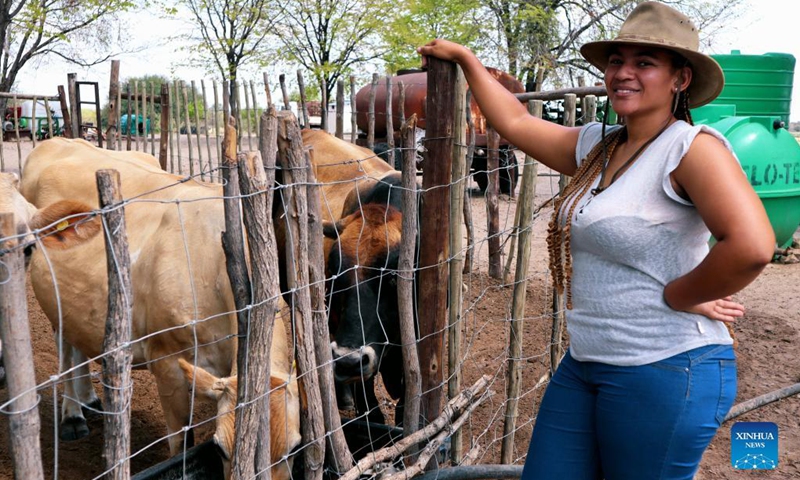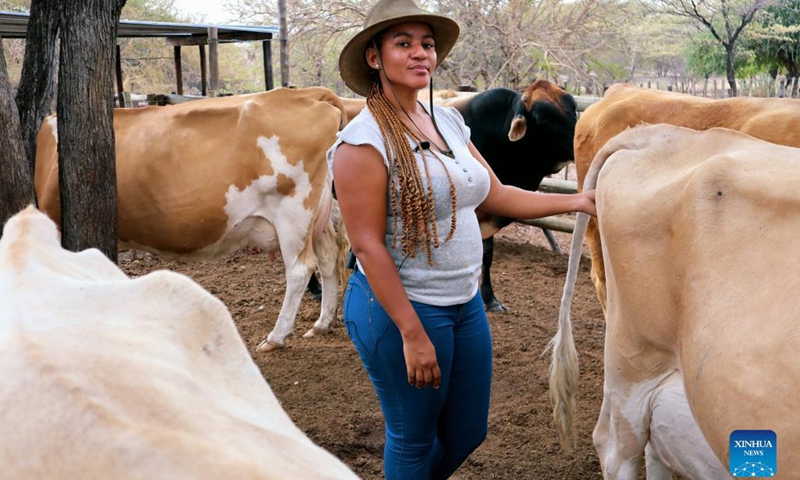
Nonny Wright, the 32-year-old owner of a commercial farming business called Lopey Inc, is seen at Sereledi farm in Polokabatho, 7 km outside Maun, Botswana, Nov. 12, 2021. "During the 2019 drought, I lost 85 percent of my dairy cows," reveals Wright.(Photo: Xinhua)

Nonny Wright, the 32-year-old owner of a commercial farming business called Lopey Inc, is seen at Sereledi farm in Polokabatho, 7 km outside Maun, Botswana, Nov. 12, 2021. "During the 2019 drought, I lost 85 percent of my dairy cows," reveals Wright.(Photo: Xinhua)
There is no questioning that droughts are synonymous with Botswana, a semi-arid country that has since proved itself to be a hotspot of heatwave activity on the African continent, as now worsened by climate change.
When citizens jest, they say the sun is manufactured in Botswana. The furnace of which is sometimes purported to be located in the tourism capital of Maun in northwest Botswana. A town that is home to Nonny Wright's cattle farm, and milk products processing plant.
"During the 2019 drought, I lost 85 percent of my dairy cows," reveals Wright, the 32-year-old owner of a commercial farming business called Lopey Inc.
Other than a dairy processing plant that supplied schools, among other institutions, with products such as fresh milk, sour milk, yogurt and ghee while encouraging the growth of the informal sector, Lopey Inc prides itself with two farms.
One being Yabarati, a farm located 10 km away from Maun in a village called Chanoga, and Sereledi, a farm that is over 100 hectares which is located in Polokabatho, just 7 km outside Maun.
"COVID-19 has not helped our business situation at all as well. But, even though we are left with 25 cows, we are now doing what we can to ensure that we get back on track, and realize the vision that we had when we first got into the dairy business," she said.
Given the fact that Botswana has been battling the socio-economic impacts of droughts year in and year out, the worst over the last decade being the 2019 drought, Wright is determined to learn from her experience and implement adaptation measures that will ensure her business stays afloat should history repeat itself.
"My first solution to the tragedy that had me depressed for a very long time, so much that I had to get counselling and was on medication, as I kept getting dizzy spells and collapsing, was to apply for a land extension of the 2 hectare farm in Chanoga so I move my cattle to where there is water that is much more drinkable unlike the water here at Sereledi," shared Wright.
Wright has since drilled a borehole in Chanoga. From it, she also intends to irrigate the feeds she ploughs for her animals.
"I have since changed the type of crops that I plant, because at first, between 2015 and 2017, I was ploughing maize. The thing with maize is that when there is little rain, or if there is too much rain it doesn't grow well. So now I opt for sweet sorghum and millet as they are more resistant," she explained.
Other than planting the right varieties of fodder crops that are fast growing and adaptable to the local climate, Wright said she plans on ploughing in December this year, as she has realized that even with the unpredictable seasons change, February rains have been flooding crops.
"Buying feeds is not always a good idea because Maun is too far from South Africa. Hence, we tend to receive low quality feeds at the highest prices," she said. To solve this issue, Maun farmers are trying to come together and expand the produce of fodder such as lucerne in their community.
Currently, Wright is doing all she can to realize her vision of being a leading dairy brand in the country. Daily, she drives to her farm with the aim of growing her herd to 200 by 2023. With the financial aid she plans on applying for from the government, she believes this is possible.
"We will also employ the use of female sex semen for artificial insemination, which will give us a 95 percent chance of getting replacement heifers, ensuring an expanded production of quality value-added products at the processing plant," she said, adding that she will see it become a household brand that is competitive in the market.
Other than creating employment and positively impacting other people's livelihoods, Nonny Wright is motivated by the desire to reduce Botswana's skyrocketing import bill.
"Once done I will support other local farmers to go into dairy cattle rearing so that the production of dairy products can be increased in Botswana," she added.
